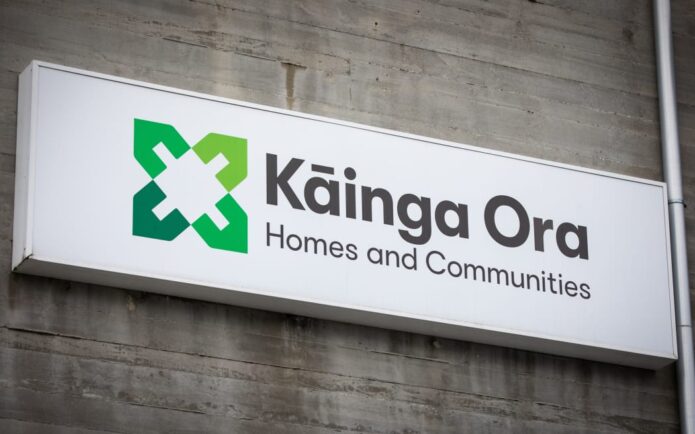PHOTO: Hayley Müller. Photo: RNZ / Nick Monro
Hayley Müller lives in Auckland‘s West Harbour with her husband and their three children. They pay $665 a week in rent, which Müller considers a great deal compared to other rentals they looked at, which were around $850.
Müller cares for their nine-month-old baby and their six- and three-year-old boys. In the winter, heating the home costs about $250 a month, groceries are $300 a week, and childcare is $220. Thirty percent of their weekly household income goes towards rent.
“We can’t necessarily look forward to saving a whole lot for buying our own home, so that’s something that you struggle with if you’re renting,” Müller says. “How much money do you have left to actually save to buy your own place?”
While they are okay with renting for now, it is unsettling being at the mercy of someone else. This is their sixth home in six years.
“It’s nerve-wracking for us. The last time, it was around Christmas, and you have to start manifesting a sense of trust that it’s going to be okay because it’s really scary not knowing if you’re going to have a home to live in. We actually moved out of that house on the day we had to.”
Hayley Müller says as renters, uncertainty hangs over them. Photo: RNZ / Nick Monro
Müller says they love their rental, but being renters means uncertainty hangs over them, and they never feel fully settled. “There is always an inherent fear that the landlord, well within their rights, will decide to sell.”
Hayley is part of a growing trend of New Zealanders who do not own their homes. Home ownership in New Zealand has dropped to below 60 percent, according to a recent report by Deloitte commissioned by Westpac, the lowest rate in almost 80 years.
The report reflects Müller’s reality, outlining how half of renters spend more than 30 percent of their income on rent.
For communications student Amani Sadique, the Mt Albert five-bedroom flat she has lived in since April last year swallows up almost 40 percent of her income. She has only just become eligible for the student allowance due to immigrating from the UK. Previously, she worked up to 20 hours a week to make ends meet. Now her budget is a bit more flexible.
“I get $100 a week from living costs and then $200 from the student allowance, which I don’t have to pay back, and from the 8 hours that I work at my part-time job, I get around $170.”
This brings her weekly income to $470. Aside from rent, about $20 goes towards bills, $20 on public transport, and $80 towards groceries. She also attends a dance class once a week, which costs $25. That leaves about $150 left over.
The flat costs $950 a week, and they are happy with that price. But the house is cold and expensive to heat. They also rely on dehumidifiers and are unsure whether the flat is fully insulated. In winter, they wear puffer jackets indoors.
“I buy little damp rid from a dollar store whenever they get too full. I have a specific pair of leather shoes that, no matter how much I wipe them or how I store them, mould keeps growing on them. Some of the other flatmates have it worse. One flatmate, who is moving out, said recently she did a clear-out, and a lot of her clothes had mould on them.”
Just a few days after Checkpoint visited, the flat was given notice from their landlord that they needed to move out. Now Sadique faces a similar situation to the one she was in just a year ago—trying to find a rental that fits her budget.
“It was basically, if I don’t have a place within four weeks, I’ve got nowhere to go. I did feel really helpless at one point.”
SOURCE: RNZ















